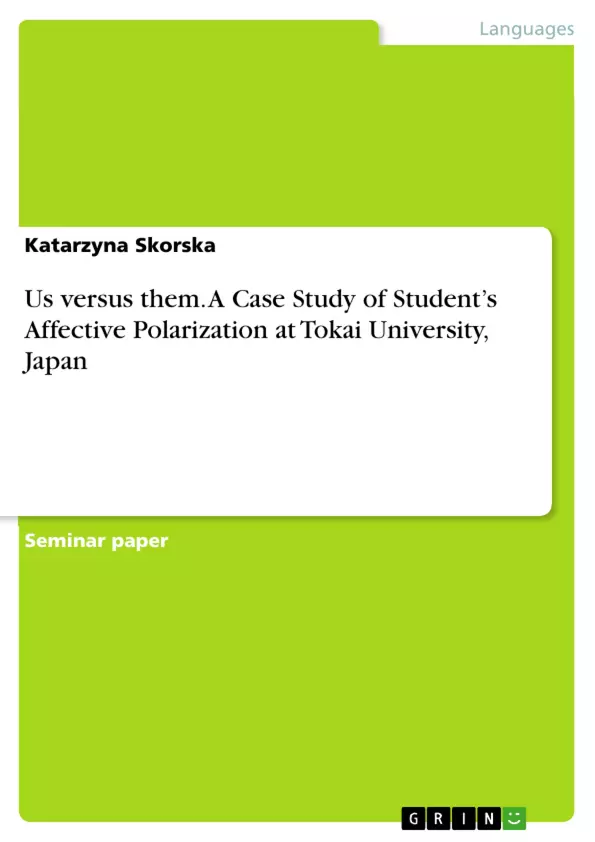Drawing on a case-study approach, the leading question of this research plan is what kind of affective polarization can be identified among students at Tokai University in Japan.
“Till Trump Do Us Part: The Relationship Deal Breaker We Never Saw Coming” is a catchy title of an article, in which the author illustrates cases of couples who are ending their relationships due to their different political leanings. As the atmosphere of political animosity between the two main rivaling camps in America- Democrats and Republicans is only being fueled every day, people slowly start to look for other co-partisans to form with them their private lives. On the other hand, those already in a relationship with out-partisans declare that they: “(...)often feel as though their partners don’t understand their own specific fears and anxieties — or that they simply are so far apart politically that the relationship can’t continue.” This phenomenon, known broadly in social sciences as affective polarization, has been emerging as a consequence of political polarization and has been on the rise in recent years in America.
I divide affective polarization into two types: affective polarization manifested in attitudes toward political representatives (parties, political leaders etc.) or also called vertical and manifested in interpersonal attitudes or called “horizontal”. The research foresees two studies conducted in a time interval- one in late 2023 and one in 2025, before the elections in Japan.
Inhaltsverzeichnis (Table of Contents)
- Introduction
- Research question
- Literature review
- Affective polarization
- Japan's political landscape
- Research plan
- Objectives
- Research Design
- Expected Findings
Zielsetzung und Themenschwerpunkte (Objectives and Key Themes)
This research plan aims to identify and analyze the types of affective polarization present among students at Tokai University in Japan. It will explore the manifestation of affective polarization in attitudes toward political representatives and in interpersonal attitudes. The research will be conducted through two case studies, one in late 2023 and another in 2025, before the elections in Japan.
- Affective polarization in Japanese politics
- The impact of political polarization on interpersonal relationships
- The role of social identity theory in understanding affective polarization
- Comparison of affective polarization in Japan and other countries
- The potential influence of affective polarization on democratic backsliding in Japan
Zusammenfassung der Kapitel (Chapter Summaries)
- Introduction: This chapter introduces the research question, which focuses on identifying the types of affective polarization present among students at Tokai University in Japan. It also provides a brief overview of the relevant literature on affective polarization and its implications for democratic governance.
- Affective polarization: This chapter delves into the concept of affective polarization, explaining its relationship to political polarization and its manifestation in attitudes toward both political representatives and individuals. It discusses key theories related to affective polarization, including social identity theory, and explores its impact on private behaviors and social interactions.
- Japan's political landscape: This chapter provides a historical overview of Japan's political landscape, highlighting the country's transition from a post-war pacifist stance to a more polarized environment. It examines the rise of the Liberal Democratic Party (LDP) and its influence on Japanese politics, as well as the contrasting views of individuals like Mishima Yukio, who advocated for a return to traditional Japanese values.
Schlüsselwörter (Keywords)
The main keywords and focus topics of this research plan include affective polarization, political polarization, social identity theory, democratic backsliding, political representatives, interpersonal attitudes, partisan social distance, partisan-based stereotyping, Japan's political landscape, Liberal Democratic Party (LDP), and Tokai University.
- Citation du texte
- Katarzyna Skorska (Auteur), 2023, Us versus them. A Case Study of Student’s Affective Polarization at Tokai University, Japan, Munich, GRIN Verlag, https://www.grin.com/document/1498921



